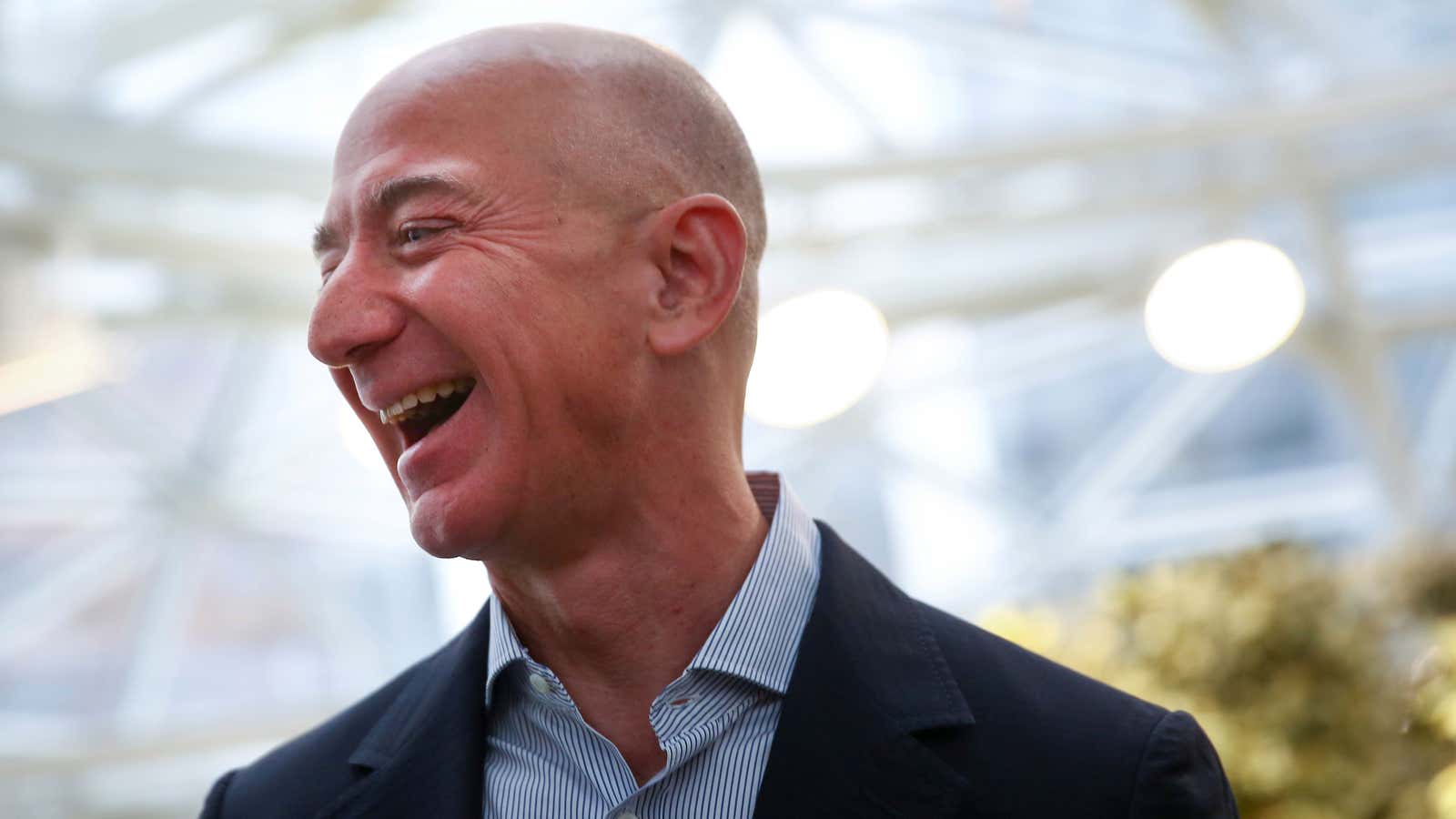It’s amazing how making it a bit easier to buy books online has led one man to become the richest person in the world, and the company he founded to dominate how many around the world shop and entertain themselves.
Jeff Bezos and Amazon have turned a once modest e-commerce platform into an economic force that’s on its way to becoming a digital panopticon. To do this, Amazon has acquired a slew of companies that many across the US, and around the world, interact with on a daily basis.
The latest is eero, a wifi-router manufacturer, which Amazon announced it had purchased on Feb. 11 for an undisclosed amount. The startup’s technology allows users to easily set up its routers to cover all parts of their homes in wifi, with what are called “mesh networks.” They’re some of the simplest routers on the market, which Quartz enjoyed when it was first released, and boast a passionate user base.
The acquisition isn’t as dramatic as others Amazon has made in recent years, but it fits nicely with the company’s emerging strategy of trying to fill every space of our lives. With eero, Amazon gets a company that makes connectivity at home a no-brainer—every other smart device in the house will work reliably, and as intended, using its propriety technology—leaving users to spend more time doing things they enjoy, which, for Amazon, hopefully includes buying more stuff.
Amazon made its biggest statement when it bought Whole Foods in 2017, providing even greater direct access to affluent consumers, as well as hundreds of new locations to store and sell Amazon products. It’s quickly integrated the chain into its delivery service, Amazon Prime Now, and offered exclusive discounts to those who’ve signed up for Amazon-branded credit cards. It’s added a tangible set of benefits to its $119-per-year Prime membership program, which also provides expedited delivery on goods from Amazon, as well as original TV programming, music, and a host of other benefits.
The acquisition also provides information. Amazon now knows what groceries its consumers are buying, and when. Amazon has threatened to put myriad industries out of business by selling their products, seeing which ones are popular, copying them, and then selling similar items for cheaper. It now knows how much you’re willing to pay for a tub of guacamole or pressed juice, and when to market you discounts.
Amazon’s data grab extends to the home. In 2014, it introduced the Echo smart speaker with the Alexa voice assistant. The company has since sold over 100 million Echo products, and says that there are 28,000 smart home devices from more than 4,500 companies that are Alexa compatible. Alexa is even starting to replace other voice assistants on their own devices.
The company also purchased the connected-doorbell company Ring in 2018. On the surface, these devices, which are essentially just cameras connected to a homeowner’s wifi network, are meant to help protect the house from potential intruders or unwanted guests. But in suburban communities where clusters of neighbors might have Ring doorbells, they’ve turned areas into mini surveillance states. Police departments across the US have been more than happy to team up with Ring-owning houses to catch thieves, and local media have jumped at the opportunity to air footage directly from the night-vision cameras on people’s doorbells. As Motherboard recently put it, Ring is “turning everyone into cops,” bringing out the worst in people who often jump to conclusions, and begin to distrust or resent their neighbors. Unsurprisingly, the cameras can often lead to racist hysteria whenever anyone who isn’t recognized by the neighborhood watch approaches.
Then there’s eero. Some of its ardent fanbase will likely be upset that a company that built itself on putting customers’ privacy first (eero sells a security service for its routers) sold to one of the largest data harvesters in the world. It may not have the same reputation as Google or Facebook, but Amazon knows everything about the goods you buy, all the questions you’ve asked Alexa, the shows you watch, and, if you have a Ring, who’s coming in and out of your house, and when. Alexa even knows when you sleep.
So a modicum of concern seems warranted now that Amazon owns a company whose devices literally control all internet traffic coming in and out of a network. While eero says it doesn’t capture that data now, as The Verge points out, who’s to say that won’t change over time now that it’s part of an enterprise with far greater ambitions?
Amazon and Bezos’s stranglehold on the neighborhood is likely to strengthen, too. While many were distracted by Bezos’s personal life this week—and his very elegant rebuttal to alleged extortion attempts—Amazon announced that it was investing in an autonomy software company called Aurora. Amazon has been investigating autonomous delivery vehicles for a while, and testing self-flying delivery drones since 2013. So it seems likely that Amazon owned or operated vehicles will be in your neighborhood one way or another in the near future.
Then there are the warehouses, fulfillment centers, offices, and data centers that litter towns across the US. While they’re great sources of employment for local areas—the company recently introduced a $15-per-hour minimum wage for all US employees—they also take their toll on workers. There have been reports of workers peeing in bottles because there was just too much work to take a bathroom break; others of heartless treatment of workers injured in Amazon facilities; and busting unions at Whole Foods. Amazon may be the second-largest private employer in the US, but that doesn’t mean the jobs it’s bringing to town are preferable.
It’s likely not long before everywhere you look in the suburbs—from the Washington Post delivered to your doorstep, to the robot bringing your groceries, to the Ring-alerted police officers on patrol, to even the movies you see at the cinema—will have Bezos’s fingerprints on it. For better or worse.
